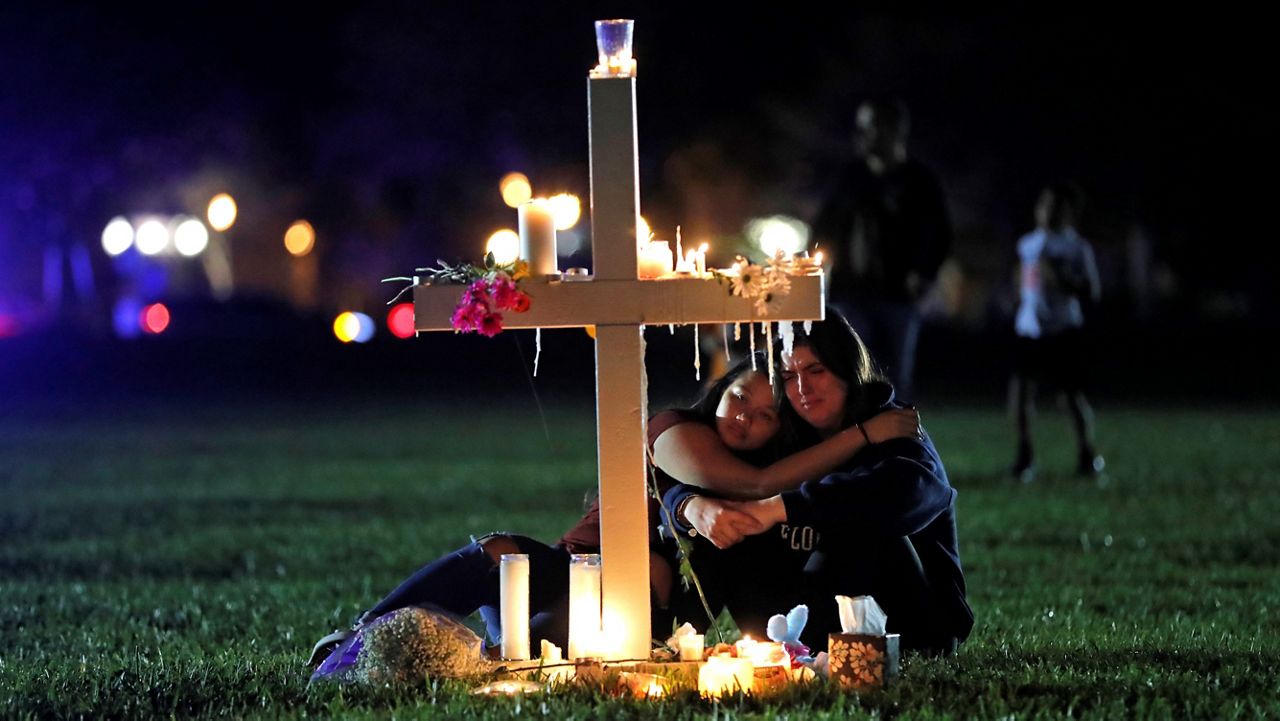Four years ago on Valentine’s Day, on a day that is supposed to be about love, a tragedy occurred at Marjory Stoneman Douglas High School that transformed the lives of the families and friends of those who died and painfully renewed a decades-old debate about guns in America.
What You Need To Know
- 17 students and staff members were killed at Marjory Stoneman Douglas High School on February 14, 2018.
- Distraught family members, wounded survivors and more fueled a wave of protests, demonstrations and massive rallies to call for gun law reform
- Parkland and the nation remain divided on the complex and controversial issue
- The accused shooter faces 17 counts of murder and 17 counts of attempted first-degree murder
Remembering those who were lost
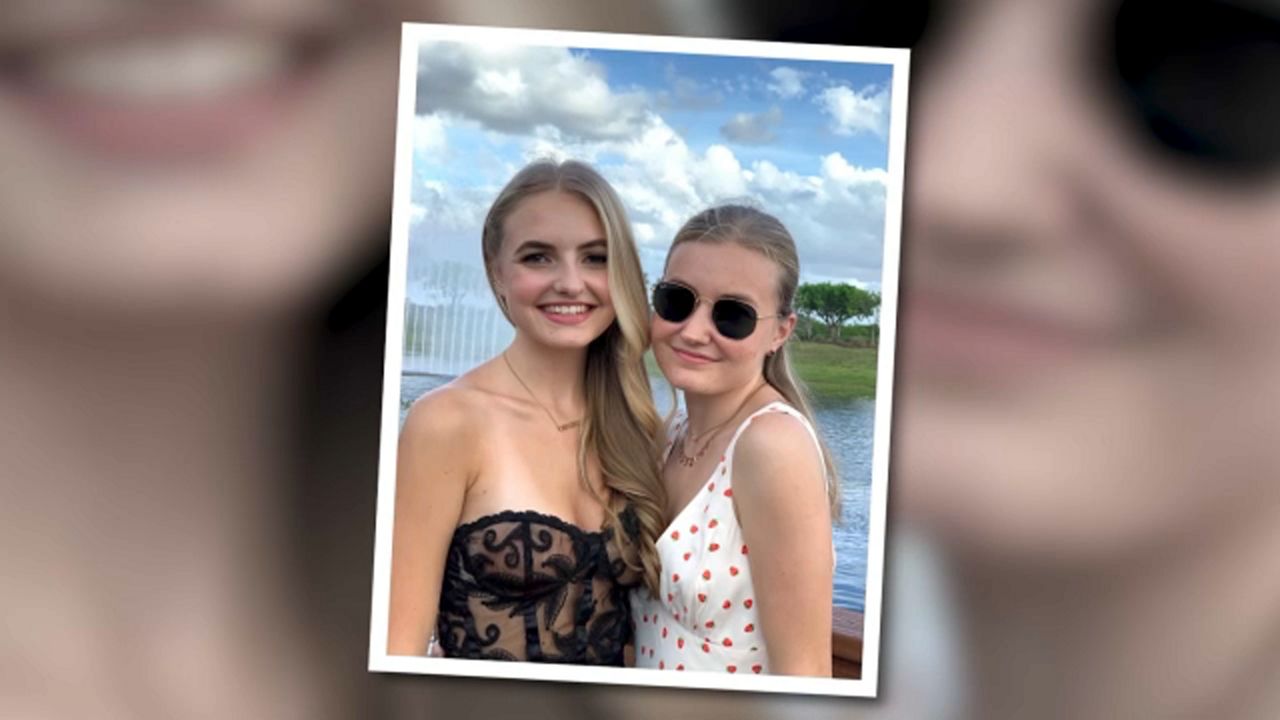
Charlotte and Madeline Dwyer were survivors of the 2018 Marjory Stoneman Douglas High School shooting in Parkland, Fla., on Valentine’s Day. (File photo)
Luke Hoyer, Martin Duque-Anguiano, Gina Mantalto, Alexander Schachter, Alaina Petty, Alyssa Alhadeff, Nicholas Dworet, Helena Ramsay, Christopher Hixon, Carmen Schentrup, Aaron Feis, Scott Beigel, Meadow Pollack, Cara Loughran, Joaquin Oliver-Padauy, Jaime Guttenberg and Peter Wang.
Those are the names of the people who were killed at Marjory Stoneman Douglas High School on Feb. 14, 2018.
Some of their last moments were spent sending text messages to their loved ones — some of whom have since turned their pain into purpose.
“I sent him to school expecting him to come home. I never thought that he would be murdered in his English class, and so I want parents to be more aware of what’s happening in their school,” said Max Schachter about his son Alexander.
His son’s death inspired him to create Safe Schools for Alex, an organization that provides best safety practices to resources to school districts, law enforcement, and parents and students.
Lori Alhadeff wrote an emotional Valentine’s letter a year after the shooting to her 14-year-old daughter Alyssa, who was fatally shot 10 times during the rampage.
“For me, it is more than that now. Last Valentine’s Day was the last time I saw you. You wore a black and white dress. Your long dark hair dangled. Your makeup looked just right. Of course, your white Converse sneakers protected your feet as you walked in to Marjory Stoneman Douglas High School,” she wrote.
Lori Alhadeff advocated for Alyssa’s Law, which calls for the installation of a silent panic alarm that is directly linked to law enforcement.
In 2020, Gov. Rod DeSantis signed Senate Bill 70 into law.
Manny Oliver has transformed his grief over the death of his son, Joaquin, into art.
"Everything that we did with these walls was coming from here," Manny Oliver said, motioning to his heart.
He was talking about 8 feet tall, 4 feet wide panels, display various images of Joaquin Oliver. His family says the art is intended to give their late son a voice in the ongoing debate over gun violence in America.
And they're not alone.
Fred Guttenberg has become a senior adviser to Brady PAC. His 14-year-old daughter Jaime was an aspiring dancer and gymnast.
“Jaime may only have been 14, but she was the toughest, wisest person I ever knew,” Guttenberg said. “If you want to know my motivation for why I’m doing this with Brady PAC right now, that’s the reason.”
Impacts of the calls for change
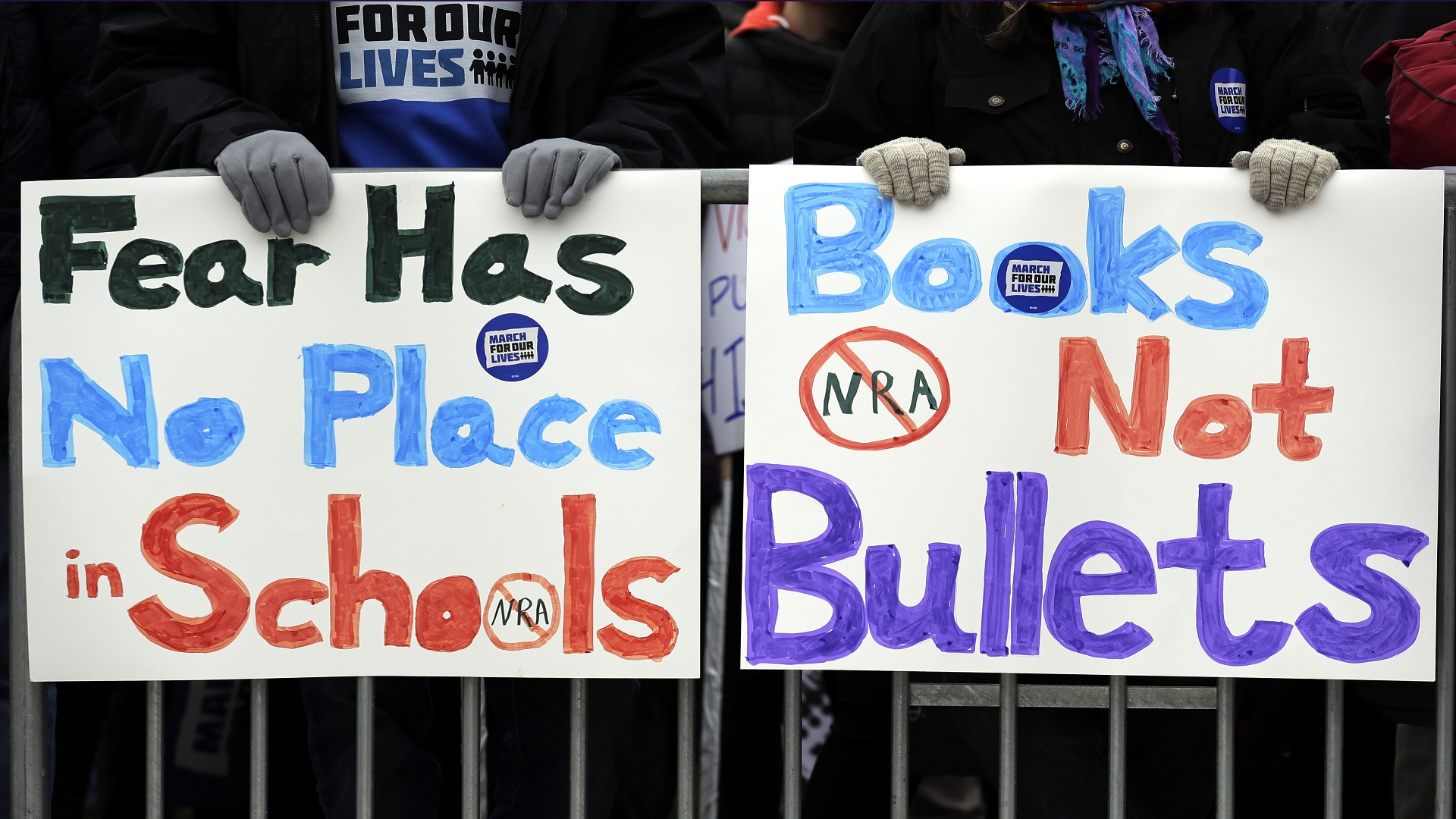
After the mass shooting in Parkland that left 17 people killed and 17 others wounded, many wanted a change to keeping students safe. (File photo)
Distraught family members, wounded survivors and more cried out across the nation for a change. Many said that enough was enough — and action was taken.
In 2018, then-Gov. Rick Scott signed Florida’s Red Flag law into effect, giving judges the authority to revoke firearms from those deemed to be a threat to themselves or others.
As a U.S. senator, Scott in 2019 filed federal legislation in response to Parkland, requiring the FBI to share data with state law enforcement about any tips it receives about threats and what action it took.
“This is about getting information on threats into the hands of the right people who can prevent violence and protect our families,” Scott said on Oct.17, 2019.
After the shooting, the Marjory Stoneman Douglas High School Public Safety Commission was formed. The purpose was simple: To analyze the information from the Parkland shooting and other mass shooting incidents and provide recommendations to improve and prevent a shooting from happening again.
In August of 2019, the commission voted to recommend to the legislature to get rid of school-based diversion programs, including Broward County's controversial PROMISE program.
Broward County's PROMISE program was criticized after the mass shooting. Critics have argued it kept the alleged gunman from being arrested when the warning signs were allegedly there.
One of the more vocal supports for change is Parkland survivor David Hogg, who has become a popular activist.
He is one of the more active members of the anti-gun violence organization March For Our Lives, a student movement.
“When you get a bunch of traumatized teenagers together and say, ‘It’s up to you to fix this,’ ... the weight that puts on a 17-year-old mind or a 14-year-old mind like my sister’s after she lost four friends that day is enormous,” he said of the group.
Hogg, who is now a student at Harvard, delayed college for a year to help grow the organization.
During a commencement ceremony at Marjory Stoneman Douglas High School in June 2021, President Joe Biden made a surprise video to the graduating seniors who were just freshmen when the deadly attack took 17 lives.
“Three years ago, your lives and the lives of this community changed in an instant,” Biden told the graduates in the recording. “This class lost a piece of its soul. You’ve been tested in ways no young person should ever have to face — from a freshman year, a year of unspeakable loss, to a junior and senior year upended by a pandemic.”
Of the 14 students who died in the school shooting, nine of those students would have graduated with the Class of 2021. Instead, their parents received their diplomas.
On Feb. 22, 2022, the president released a statement where he honored those who died in the Parkland shooting, but also vowed to end what he called an "epidemic of gun violence."
"My Administration stands with those working to end this epidemic of gun violence. I have put forward a comprehensive plan to reduce gun crime that includes curbing the proliferation of “ghost” guns, cracking down on gun dealers who willfully violate the law, issuing model extreme risk protection order legislation for states, and promoting safe firearm storage, among other efforts," Biden stated.
He also vowed to keep everyone safe from gun violence as he urged Congress to take action on gun control.
"We can never bring back those we’ve lost," Biden stated, adding, "For Parkland, for all those we’ve lost, and for all those left behind, it is time to uphold that solemn obligation."
A community as divided as the nation
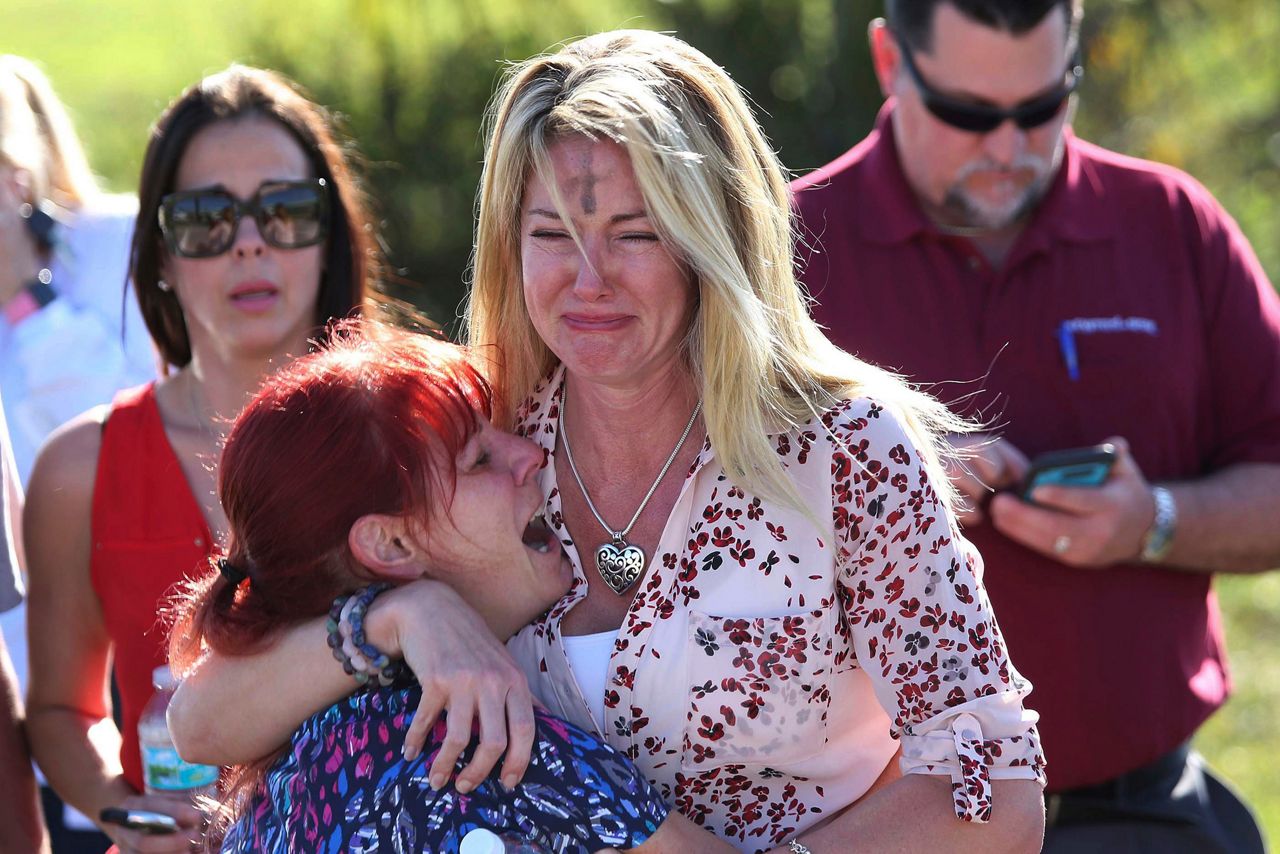 In this Feb. 14, 2018, file photo, Mechelle Boyle, right, embraces Cathi Rush as they wait for news after reports of a shooting at Marjory Stoneman Douglas High School in Parkland, Fla. The image become emblematic of the Parkland school massacre. (Joel Auerbach/AP)
In this Feb. 14, 2018, file photo, Mechelle Boyle, right, embraces Cathi Rush as they wait for news after reports of a shooting at Marjory Stoneman Douglas High School in Parkland, Fla. The image become emblematic of the Parkland school massacre. (Joel Auerbach/AP)Despite the national outpouring of support and new laws put in place, many are still divided over what to do when it comes to school safety.
This could not be reflected more than in the case of two Parkland mothers: Mechelle Boyle and Cathi Rush.
Before the shooting, these two women were very friendly towards each other as their children had attended the same elementary school.
In fact, Rush’s ex-husband coached Boyle’s son’s soccer team.
When the shooting happened, both mothers hurried to the high school. Boyle, whose three children did not attend Marjory Stoneman Douglas High School, was there in a show of support.
It was support that Rush needed as she did not yet know what happened to her son, Brandon, who was still in the school at the time and could only text his mother that he was hiding under a desk. Not knowing caused the mother to fall to the ground, screaming in anguish.
It was Boyle who pulled her up, and the two embraced as a whirl of sounds from helicopters and police sirens cut through the air.
"My heart just started breaking," Boyle recalled in a 2019 Associated Press interview. "Oh, my God, she doesn't know if her son is alive or dead. She's here crying and can't reach him."
Brandon as OK.
A year later, the two women who once embraced each other as chaos unfolded around them were no longer acquainted.
Rush wanted to see stronger gun control laws and joined Moms Demand Action, an organization to protect people against gun violence.
Boyle, who served eight years in the military and owns a gun, also joined the group. She supports gun rights but has also worked to pass stricter gun control laws in some cases, saying it "made no sense to me" that the gunman was able to buy an AR-15 rifle at age 18.
For Rush, she stopped going to Moms Demand Action meetings because she found activism traumatized her.
But over time, their politics were not in line with each other, and they lost contact.
They each have their own views as to why the once united front separated. For Boyle, she felt her once colleague did not like the fact that she was more pro-gun than her.
Rush said the shooting ended up dividing their community instead of uniting it.
“This community has fractured into two factions now,” she said, between those who want to crack down on guns and those who want to see schools turned into “fortresses.”
The accused
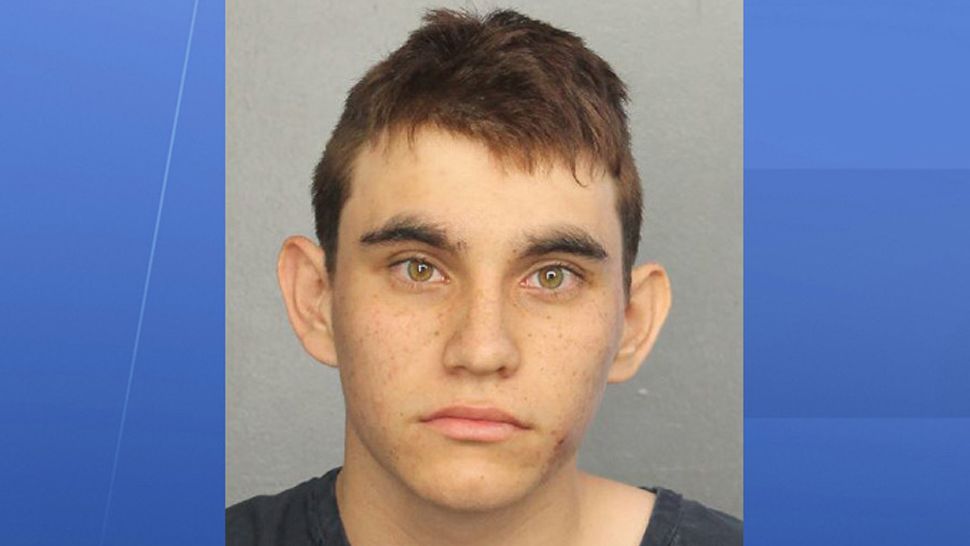
Nikolas Cruz is currently facing 17 counts of murder and 17 counts of attempted first-degree murder for those wounded. (File photo)
On Feb. 14, 2018, Nikolas Cruz walked into the Parkland, Fla., high school and gunned down 14 students and three teachers and wounded 17 others, according to authorities. He faces 17 counts of murder and 17 counts of attempted first-degree murder.
Details of his past came to light as his case moved through the system. Cruz came from a troubled home. He was adopted as soon as he was born from a mother with a criminal history of drug offenses, domestic violence and car theft.
Cruz and his non-biological brother, Zachary, were adopted by Roger and Linda Cruz. At a young age, Cruz’s adoptive father died. His adoptive mother died a few months before the shooting.
However, before then, there were issues involving Cruz. Throughout his life, he had behavioral and learning problems. He also had a fascination with guns and was mixed up with drugs and alcohol.
But as he got older, things appeared worst for Cruz. It was recommended that he be “Baker Acted,” which would have issued a warning if he tried to buy a gun legally.
According to the Henderson Behavioral Health documents, even his adoptive mother had concerns about his mental state after he was punching holes into walls.
Cruz told Henderson Behavioral Health clinicians that he did that because of a breakup with his girlfriend, but later it was discovered that he admitted to cutting his arms because he was lonely and his grades were falling.
Law enforcement visited his home many times and the FBI was contacted because Cruz was believed to have the possibility of becoming a school shooter.
In fact, in November of 2021, the families of the Marjory Stoneman Douglas shooting victims announced they would receive around $130 million from the U.S. Department of Justice, saying they have settled with the government over the FBI's failure to investigate a tip it received about a month before the massacre.
Months after the Valentine’s Day shootings, officials received cellphone videos that Cruz allegedly made that he posted to social media, going into detail about how he planned to go into Marjory Stoneman Douglas High School and kill as many people as possible with his recently purchased AR-15 firearm.
Once arrested on that fateful day that shocked the nation, the then 19-year-old Cruz claimed to detectives that he heard a demon, which told him to “Burn. Kill. Destroy.”
During the interrogation, Cruz said that the voice he heard in his head belonged to a young adult, and that he liked listening to it because the alternative would be he had no one to talk to and he did not like the loneliness, the report continued.
His trial has been pushed back for a variety of reasons, with it originally supposed to have started in 2020, but the COVID-19 pandemic caused numerous delays, in addition to the more than 1,000 potential witnesses who needed to be interviewed during that time.
In October of 2021, Cruz pleaded guilty to all charges: 17 counts of murder and 17 counts of attempted first-degree murder for those wounded in the attack.
Earlier this month, Circuit Judge Elizabeth Scherer moved the start of jury selection from Feb. 21, 2022, until the first week of April after attorneys for both sides stated they needed more time to interview mental health experts.
The Associated Press contributed to this story.




